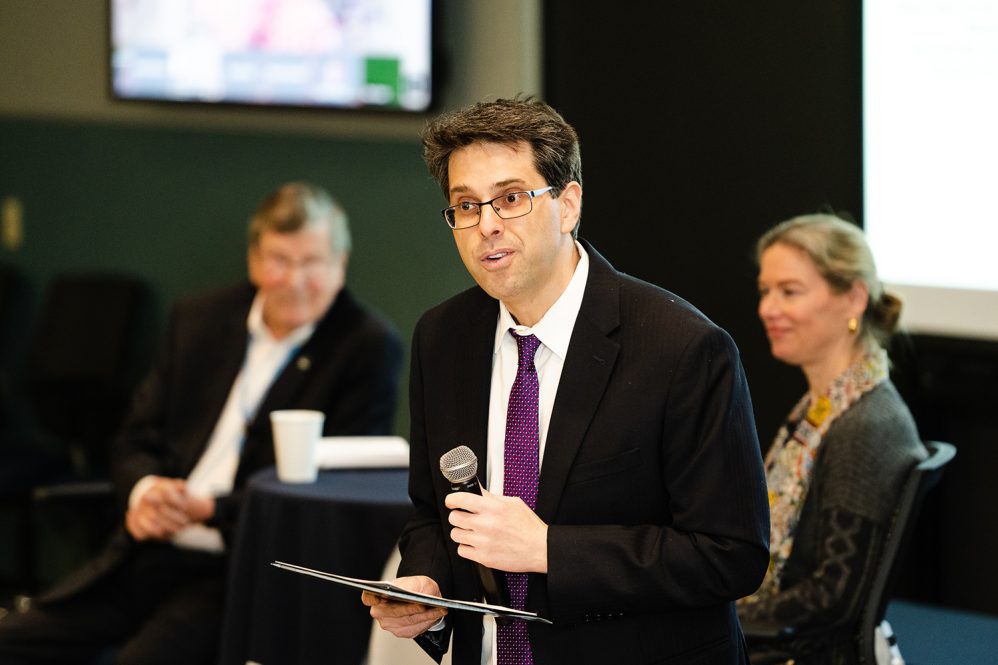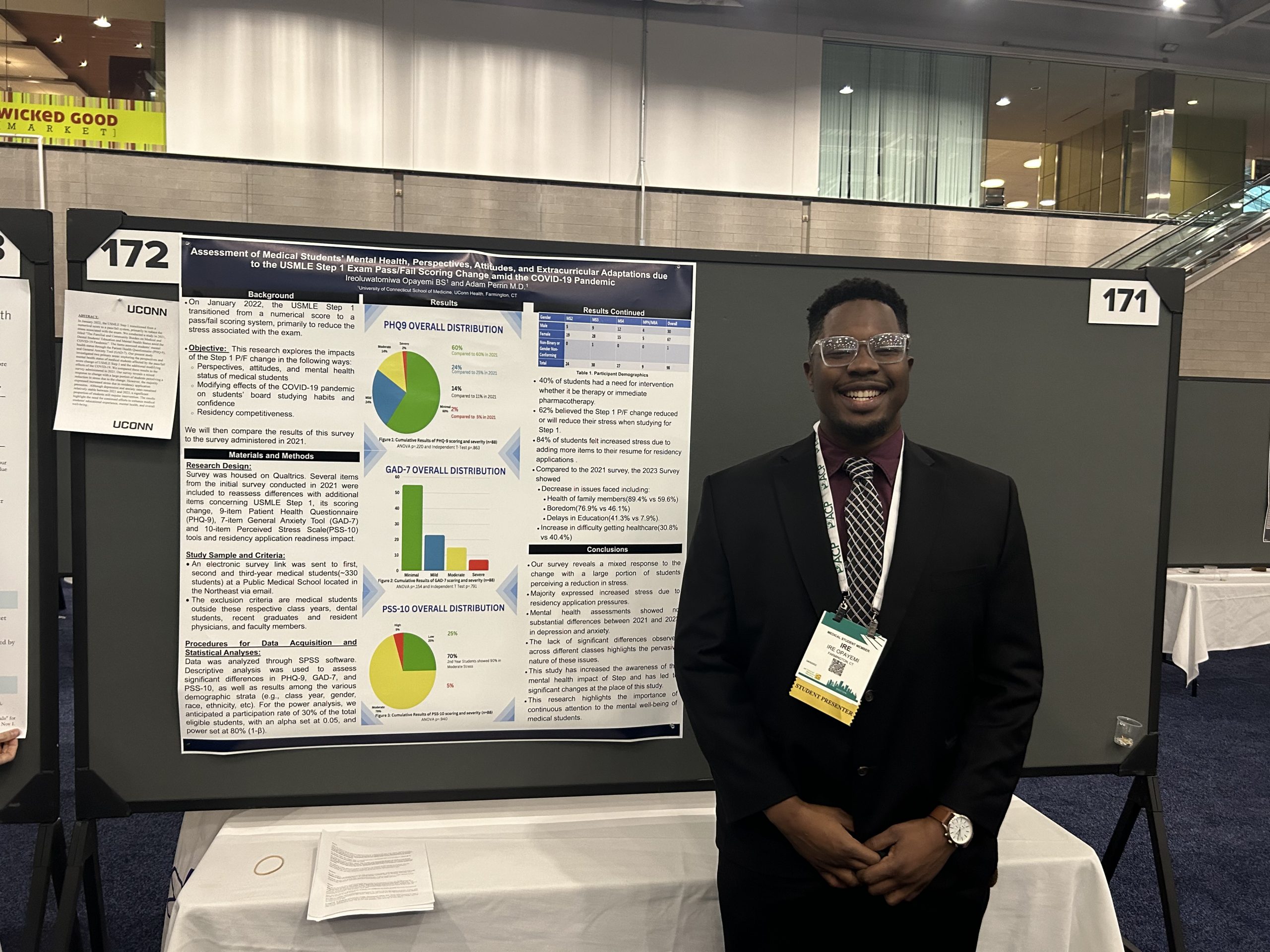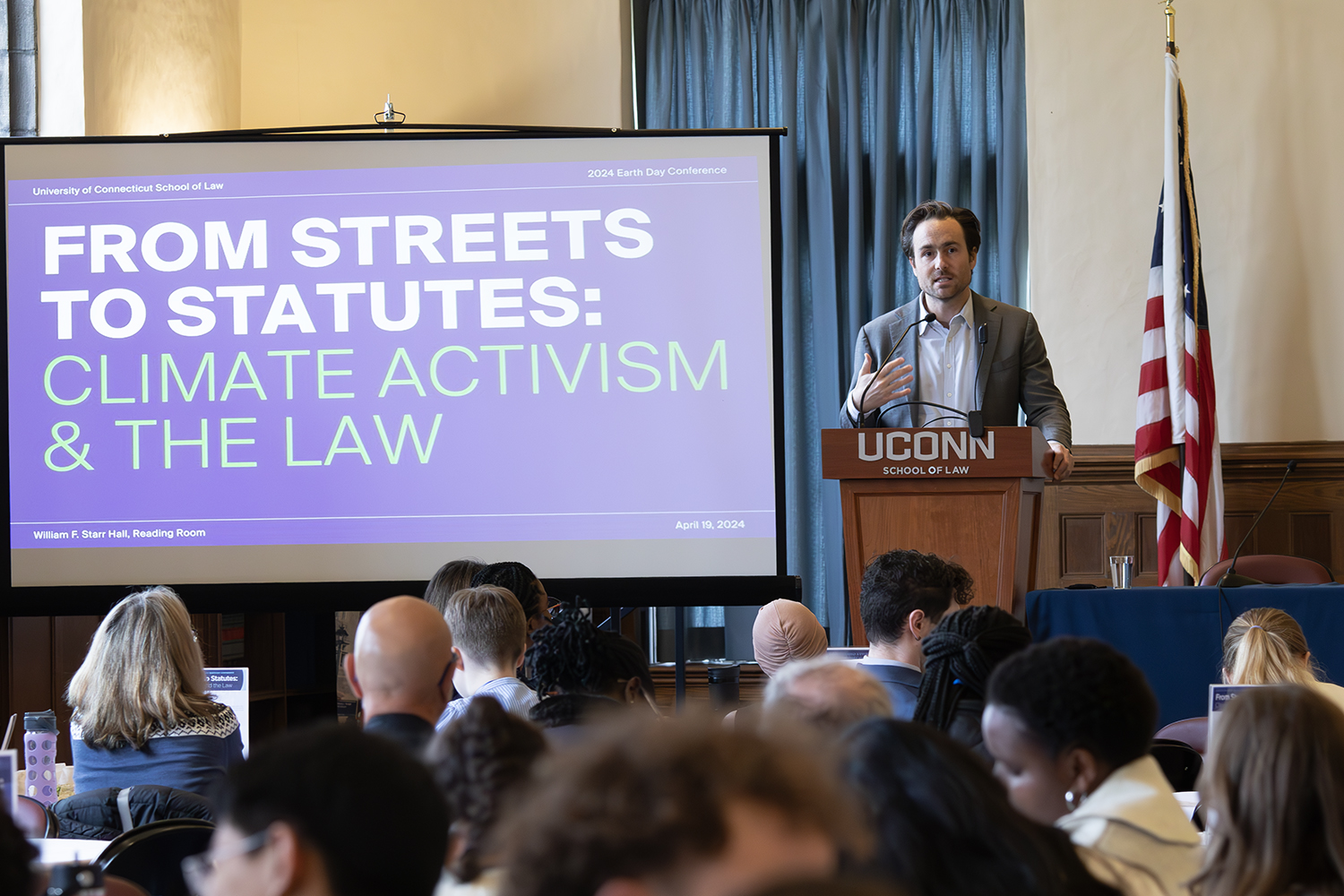The School of Business’ second annual Global Business Leadership in Sustainability Summit offered a blend of optimism and stark reality about the future of business and the planet to a passionate group of students, alumni, faculty, and industry experts.
The event addressed a variety of topics, including how some 90 percent of Connecticut’s food supply is imported. Other speakers warned about companies ‘greenwashing’ their track records and environmental efforts. Even U.S. President Teddy Roosevelt entered the discussion, as he was an early adopter of electric vehicle technology, riding in an electric motorcade during a 1902 visit to Hartford.
“This year’s summit highlighted the potential that students and young alumni have to make sustainable practices a reality,” said professor Robert Bird, who teaches business law, is a champion for sustainability, and serves as the Eversource Energy Chair in Business Ethics. “The challenges may be significant, but it is the ability and enthusiasm that we observed at the summit that is necessary to make real change happen.”
Arminda Kamphausen, Director of Global & Sustainability Initiatives and the conference organizer, said this year’s events included interesting, varied, and challenging content, but also offered participants a chance to make impactful connections and have important conversations.
“We all know we cannot make significant change on our own, we need to find those with complimentary and yet diverse skills and passions with whom we can work alongside,” she said. “One of the main goals of the Summit is to provide the opportunity to discover new connections. For this reason, the event is open to everyone. All are welcome.”
The students who attended Friday’s program said they were intrigued by what they learned, both good and bad, and that sustainability will play a role in their professional and personal lives.
Joseph Roberts, a junior majoring in finance, said he cares deeply about the future of the planet and he hopes his peers do as well.
“I think it is great to get this into the minds of students and alumni,” he said. “Around the world, there’s a lot of noise, there’s a lot of talk. But we’re on the verge of extinction if we don’t do something about it.”
Victor Nanovsky, a sophomore finance major, said sustainability will factor into his career plans. “I see sustainability as a given. I would not work for a company that’s destroying the environment for profit,” he said emphatically.
Dig for Information—Then Dig Harder
The program kicked off with School of Business Dean John A. Elliott interviewing Dinah Koehler, head of ESG Research at FactSet. She told the audience that companies are becoming increasingly adept at “greenwashing” the information that they voluntarily release. While those reports should be reviewed, financial analysts should also take advantage of government reports that offer a less biased view of company and industry performances, she said. Those reports often offer insights into accidents, employee injuries and exposures, pollution and much more. The Federal Railroad Administration, for example, has documentation that showed the previous costly derailments tied to Norfolk Southern, the company responsible for the much-publicized train derailment in East Palestine, Ohio.
Both she and Elliott urged the audience to not believe everything they read and to make sure they aren’t propagating false data. Europe is leading the way in terms of corporate transparency and regulation. It will soon be a more prominent issue in the U.S., and many companies are fearful of the fallout, she said.
Food Sourcing, Disposal is a Big Problem in Connecticut
Only 10 percent of the food that Connecticut residents consume is sourced in the state, said Richard Meinert, center coordinator and agriculture nutrient management expert at UConn, in a panel presentation on food supply and food waste.
That means a great deal of energy is used, and pollution is created, getting fresh food here either by train or by truck. “If you buy an out-of-season fruit, it likely arrived on a train called The Fresh Express,” he said. “There’s only so long you can keep a salad-in-a-bag fresh.”
Disposing of waste is extremely expensive in Connecticut and usually requires shipping to another state, said alumnus Brian Paganini, vice president and managing director of Quantum Biopower, the state’s only food-to-energy plant, located in Southington. About 22 percent of garbage is food waste, he said.
Stephanie Robles, a business expert for reSET in Hartford, an organization that supports 250 startups a year, said food and agricultural business startups have skyrocketed recently. She’s encouraged that most early-stage companies are thinking about sustainability from the beginning and are eager to work with local farmers and to minimize waste.
Sam King, CFO and director of Blue Earth Compost, said one of his company’s biggest challenges is to make it simple for consumers to make ecofriendly decisions. “Sustainability doesn’t exist without accessibility,” he said. “Composting is one of the easiest ways to address sustainability.”
Accompanying him on the panel was Dan Martens, vice president of Novamont, which creates biopolymer compostable bags, as well as environmentally friendly agriculture products and compostable shopping bags. The organization was voted among the “Best for the World” B-Corps in 2022. The company’s U.S. headquarters is in Shelton.
Robles ended the session on a positive note. “You’re in this room because you care,” she said. “You make an impact by being mindful of what’s going on around you. Build relationships and think about the impact you want to have.”
Roosevelt and the Electric Vehicle
When U.S. President Theodore Roosevelt visited Hartford in 1902, he rode through the streets in an electric vehicle. The car was made by the Columbia Electric Vehicle Co. in Hartford, which made both electric and gasoline-run automobiles.
The progressive mode of transportation didn’t evolve because there was no financial support to make it grow, said Sara Harari, associate director of innovation and senior advisor to the President and CEO of Connecticut Green Bank. A green bank is a mission-driven organization that uses financing to accelerate the transition to clean energy and to fight climate change.
She shared her experiences during a panel about “Entrepreneurship, Innovation & Venture Capital” with entrepreneurship professor Ryan Coles.
Today Harari works to make sure sustainable innovations have a future. When solar panels were gaining popularity, Harari said, companies were reluctant to install them in poorer neighborhoods because they feared homeowners would default on their payments. Connecticut Green Bank was able to create a formula to minimize that risk and ultimately the solar companies were able to offer the energy-saving technology to a larger swath of residents.
“Every job is a climate-change job,” Harari told the audience. “Every company is being evaluated for climate-change risk. Whether you work for Patagonia or a traditional company, you are now an agent for change.”
Coles described his work with Daigle Labs, developing sustainable businesses and emerging technology in 10 countries, including Vietnam, Jordan, Peru, and Paraguay.
“No other species on earth has the ability to destroy all the life on earth,” Coles said. “But given our power, and our cognitive ability to use that power for collective purpose, my great hope is that we can do something about it.”
Subhead: Young Alumni Share Their Advice
In another session, professor Shareen Hertel, who teaches political science and human rights, interviewed four young alumnae about their experiences working in the sustainability field.
Duygu Ozcan ’22, a PRISM analytics associate for Henkel, said she majored in business management, but also cared passionately about the world. “I wanted to create change from the inside,” she said. Her advice to students? Pick a good organization to work for, and then find your way into its sustainability team.
Lily Stiffler ’21, an analyst for Arctaris Impact Investors, described a financial project that she was involved in that revived a closed ski mountain in Maine. Instead of just a traditional sale, the initiative involved sustainable improvements, including the addition of solar panels on the land, more energy-efficient chair lifts, and the creation of new jobs. The transaction enhanced the wellbeing of the community, she said.
Radhika Kanaskar ’18 took a field trip to the Federal Reserve in Boston and ended up getting a job there as an environmental sustainability program lead. Today she works in the management of the Federal Reserve’s Boston property, and her job incorporates everything from climate action to waste reduction to community outreach and employee education. “Sustainability pervades every aspect of business today. If you know what resonates with you, there’s an opportunity out there,” she said.
Liz Willson ’22, investor network program assistant at SICS Ceres, worries about a sustainability backlash. At the same time, her company has doubled in size, and her team is three times larger than it was last year. “I hope that ESG comes out on top because it is good for investors and shareholders,” she said. “You can’t work in this field without hope that all will turn out in our favor!”



